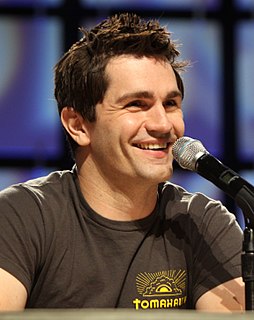A Quote by Samuel Witwer
When something goes wrong in our lives we often ask ourselves "Who was present?" and if there was ever a singular person that was present in whatever the event was when something changed our lives. If we can't get beyond that event, we become obsessed with it or it changed our life in a way that we can't make sense of. We often seek out that person because that was the last time our lives made sense.
Related Quotes
Often the deep valleys of our PRESENT will be UNDERSTOOD only by LOOKING BACK on them from the mountains of our FUTURE experience. Often we can’t see the LORD’S HAND in our lives until long after the trials have passed. Often the most difficult times of our lives are ESSENTIAL building blocks that form the FOUNDATION of our CHARACTER and pave the way to FUTURE opportunity, understanding, and happiness.
It requires something more than personal experience to gain a philosophy or point of view from any specific event. It is the quality of our response to the event and our capacity to enter into the lives of others that help us to make their lives and experiences our own. In my own case my convictions have derived and developed from events in the lives of others as well as from my own experience. What I have seen meted out to others by authority and repression, economic and political, transcends anything I myself may have endured.
There is a foundation for our lives, a place in which our life rests. That place is nothing but the present moment, as we see, hear, experience what is. If we do not return to that place, we live our lives out of our heads. We blame others; we complain; we feel sorry for ourselves. All of these symptoms show that we're stuck in our thoughts. We're out of touch with the open space that is always right here.
So that's how we live our lives. No matter how deep and fatal the loss, no matter how important the thing that's stolen from us--that's snatched right out of our hands--even if we are left completely changed, with only the outer layer of skin from before, we continue to play out our lives this way, in silence. We draw ever nearer to the end of our allotted span of time, bidding it farewell as it trails off behind. Repeating, often adroitly, the endless deeds of the everyday. Leaving behind a feeling of immeasurable emptiness.
I don't think that all girls seek the influence of older men, but I think girls whose fathers are absent or recessed from their lives often do. And honestly, when I was growing up, fathers were generally pretty absent from their children's lives. We didn't see a lot of them. That may be something that has genuinely changed for the better in our culture: men are more present for their children now that more women are working.
Take death for example. A great deal of our effort goes into avoiding it. We make extraordinary efforts to delay it, and often consider its intrusion a tragic event. Yet we'd find it hard to live without it. Death gives meaning to our lives. It gives importance and value to time. Time would become meaningless if there were too much of it.
Every person needs to feel significant. We want our lives to count. We yearn to believe that in some way we are important and that hunger for significance-a drive as intense as our need for oxygen-doesn't come from pride or ego. It comes from God because he wants each of us to understand how important we are. ... We must seek our roots, our origin, and our destiny so that we can know our present value. ..... ...We can help each other realize that we are persons of significance being made in the image of God.
Peace is not just the absence of war, it is the active presence of a capacity for love and compassion, and reciprocity. It is an awareness that our lives are not to be lived simply for ourselves through expressing our individuality, but we confirm the purpose of our lives through the work of expressing our shared sense of community in a purposeful and practical way; to sustain our own lives we sustain the lives of others - in family, in a community of neighborhoods called a city, and in a community of nations called the world.



































